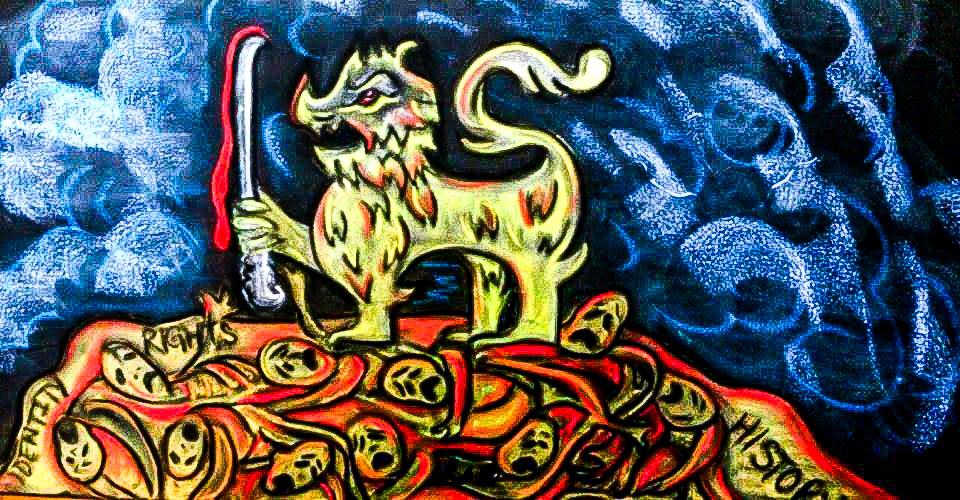This week, Tamils took to streets to send the Sri Lankan state a message – just as they did in the 1950’s.

The issue of Sinhala colonisation of the North-East is not new. It is one that has plagued the island for decades, as successive Sri Lankan governments have purposefully and forcefully sought to alter the demographics of the Tamil region. This week, Tamils took to streets to send the Sri Lankan state a message – just as they did in the 1950’s. The colonisation must stop. The military occupation must end. And the continued takeover of land that belongs to the Tamil people must finally be reversed. The Tamil homeland must be set free.
The protest against the Tissa Vihara in Jaffna, the latest focal point of the state’s ongoing colonisation of the North-East, has been ongoing for over a year now. Built on top of land that was taken from Tamil villagers and seized by the military as a High Security Zone (HSZ), the Buddhist temple is now looking to acquire even more land and expand even further. All whilst soldiers who helped with its construction now stand ominously on guard as locals demonstrate. It is just one site out of many across the North-East, where such military and state sponsored projects have taken place. Buddhist structures are being erected at rapid pace, whilst Sinhala monks, many of whom harbour extreme racist views, are being settled with the blessings of the occupying forces.
The rationale behind this has long been clear. The Sri Lankan state and its apparatus has always deemed the entire island to be a Sinhala Buddhist bastion – despite the Tamil nation’s millennia long presence and roots. Alongside the ongoing massive military occupation, the construction of war ‘victory’ monuments, and the Sinhala settlers being shipped in, the growth of Buddhist structures in the North-East are part of a strategy that asserts Sinhala Buddhist dominance in Tamil regions. Together with the massacres that have taken the lives of hundreds of thousands, these colonisation attempts are part of a deliberate strategy to erode the Tamil homeland and erase any claims to nationhood or self-determination. As protestors highlighted this week, it is all part and package of the state’s genocide of the Tamil people.
Yet, despite it being more than four months since Anura Kumara Dissanayake took up office, the work of the monks and the military has continued unabated. His government’s lofty promises of equality to Tamils are completely undermined by his lack of action to tackle what is clearly a racist and chauvinistic endeavour. Not a single Buddhist vihara has been taken down, nor has a single army camp has been dismantled.
Instead, the state’s machinery continues to facilitate these aggressive land grabs, deepening the military occupation and allowing Sinhala Buddhist hegemony to expand unchecked. The silence from Dissanayake’s administration speaks volumes. His government, like those before it, is unwilling to confront the entrenched structures of Sinhala Buddhist supremacy that have driven decades of oppression, displacement, and dispossession of the Tamil people. His failure to act makes his rhetoric of equality meaningless.
Tamils, however, will not remain silent. The protests in Jaffna are a testament to their resilience and unwavering determination to protect their land, history, and identity. These demonstrations are not just about the Tissa Vihara—they are about the very survival of the Tamil homeland. Every inch of land that is stolen, every temple that is built, and every soldier that remains stationed in the North-East is an assault on the Tamil nation.
The international community, too, must take note. The continued land grabs and the systematic efforts to alter the demographics of the North-East are violations of fundamental human rights and international law. They are part of a broader genocidal process that has sought to subjugate the Tamil people for decades. Sri Lanka has shown time and again that it will not hold itself accountable. The burden, therefore, falls on the international community to act.
The Tamil people have long known that justice and freedom will not come from Colombo. It must be fought for and won through struggle—just as it has been throughout history. The resistance against Sinhala colonisation is not new, and it will not end here. This land belongs to the Tamil people. And no amount of state-sponsored settlements, military occupations, or forced Buddhist colonisation will change that fundamental truth.